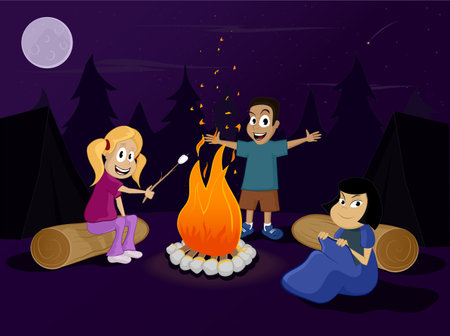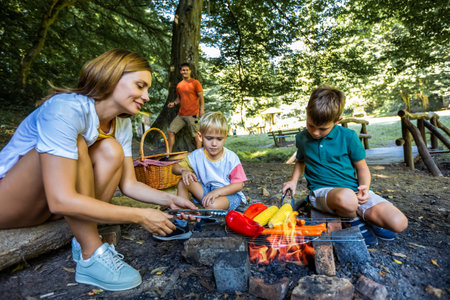Introduction: The Charm of Family Camping in the UK
There’s something irresistibly enchanting about packing up the car, leaving behind the city bustle, and heading into the heart of the British countryside for a family camping adventure. From the rolling hills of the Lake District to the dramatic coastlines of Cornwall, UK campsites are woven into landscapes rich with history, wild beauty, and that ever-present sense of British tradition. These outdoor escapes have seen a remarkable resurgence in recent years, as families across the country seek meaningful ways to reconnect with nature—and each other. Amidst laughter-filled evenings and early morning dew, classic camping rituals unfold: tents pitched under oak trees, mugs of tea cradled against the chill, and hearty meals shared beneath starlit skies. Now, with the rise of electric BBQs making their entrance onto the campsite scene, there’s a new question at hand: can these modern conveniences find a place among time-honoured traditions? As we gather around our pitches this season, let’s explore whether electric BBQs are worth considering for your next family camping trip across the UK.
Understanding Electric BBQs: Features and Benefits
There’s a certain romance in the idea of gathering round the grill, the British summer sky alive with birdsong and laughter. Electric BBQs are fast becoming a mainstay for families seeking an easier, greener way to enjoy al fresco cooking at UK campsites. But what makes them stand out? Let’s unravel their core features and why they appeal to the modern camper.
Effortless Use for All Ages
Electric BBQs take away much of the fuss often associated with traditional barbecuing. There’s no need to lug bags of charcoal or wait impatiently for flames to die down. Simply plug in, set your desired temperature, and you’re ready to cook—no smoky drama or messy clean-up. This ease of use is especially welcoming for families with children or those new to camping cuisine.
Low Maintenance, High Enjoyment
Forget scrubbing stubborn ash or worrying about fire bans during dry spells. With removable drip trays and non-stick grills, cleaning up after your feast is a breeze. Many models come with dishwasher-safe parts, allowing you more time to relax under the stars rather than elbow-deep in suds.
Eco-Friendly Appeal
The growing desire to tread lightly on our countryside has led many campers to seek out sustainable options. Electric BBQs produce zero direct emissions and eliminate the need for disposable fuels, making them a friendlier choice for both air quality and local wildlife. If your chosen campsite offers renewable energy sources, your meal becomes even more environmentally conscious.
Feature Comparison: Electric vs Traditional BBQs
| Feature | Electric BBQ | Charcoal/Gas BBQ |
|---|---|---|
| Ease of Use | Plug in & go; adjustable temperature controls | Requires lighting, fuel management, manual heat control |
| Maintenance | Minimal; easy-to-clean components | Ash/grease removal; frequent deep cleaning needed |
| Eco-Friendliness | No direct emissions; compatible with green energy | Emits smoke & particulates; uses fossil fuels/charcoal |
| Campsite Compatibility | Ideal where open flames are restricted; requires power hook-up | Not allowed at some sites due to fire risk; portable but bulkier fuel required |
A Modern Companion for Family Camping Trips
With their user-friendly design, minimal upkeep, and gentle environmental footprint, electric BBQs offer a compelling alternative for UK family campers. They blend seamlessly into the rhythm of campsite life—helping you focus less on logistics and more on savouring those golden moments together around the table.

3. Are Electric BBQs Allowed on UK Campsites?
As family camping becomes ever more popular across the rolling hills and tranquil meadows of the UK, many campsites are re-evaluating their policies when it comes to outdoor cooking. Traditional charcoal or gas barbecues, though evocative of smoky summer evenings, often fall foul of strict campsite regulations due to fire risks and environmental concerns. In contrast, electric BBQs are increasingly finding favour with campsite owners and campers alike.
Most established UK campsites now list electric BBQs as either recommended or explicitly permitted. This shift is largely driven by the safety profile of electric grills—they produce no open flames, generate less smoke, and significantly reduce the risk of accidental wildfires, especially during dry spells when fire bans are common. For families with young children or those seeking peace of mind, this can be a significant reassurance.
Campsite policies do vary, however. Some sites may require you to use your electric BBQ in designated areas or connect only to specific power points designed for outdoor cooking appliances. It’s always wise to check ahead: many sites detail their BBQ rules on their websites or in welcome packs. The National Trust and Camping and Caravanning Club sites are at the forefront of these changes, frequently highlighting electric BBQs as a preferred choice for responsible outdoor dining.
The growing acceptance of electric BBQs also reflects broader trends towards sustainability and low-impact camping in Britain. Without the lingering scent of burnt fuel or piles of ash to dispose of, electric BBQs offer a cleaner, quieter alternative that fits seamlessly into the gentle rhythms of British campsite life—whether you’re pitched beside a Cornish cliff-top or nestled deep in a Lake District valley.
4. Pros and Cons: Practicality on a British Campsite
When planning a family camping trip in the UK, practicality often becomes the deciding factor when choosing between traditional BBQs and their electric counterparts. Let’s take a closer look at the real-life usability of electric BBQs amid Britain’s unique blend of countryside charm and unpredictable weather.
Portable Power: The Heart of Electric BBQ Use
First things first – you’ll need a reliable source of electricity to run an electric BBQ. While some larger campsites in the Lake District or Cornwall now offer electric hook-ups, these are by no means universal. For families headed to more remote spots in the Highlands or coastal Wales, access to power can be hit-and-miss, making portable generators or hefty power banks essential kit for aspiring grill masters. Consider this comparison:
| Electric BBQ | Traditional Gas/Charcoal BBQ | |
|---|---|---|
| Requires Mains Power? | Yes (or powerful battery/generator) | No |
| Ready to Use Instantly? | Yes, heats up quickly | No, needs time to light/heat |
| Weight & Portability | Can be bulky, depends on model | Often lighter, especially charcoal units |
| Allowed on All Sites? | Only where electric permitted/safe | Some restrictions on open flame/barbecues |
| Weather Impact | Affected by damp/rain if not sheltered | Difficult in wind/rain but still operable |
Weather Considerations: Embracing the Unpredictable Skies
Beneath brooding British clouds or during those rare sun-dappled afternoons, weather is always a wildcard. Electric BBQs generally cope well in mild drizzle if you’ve got a covered awning or gazebo. However, heavy rain can pose safety risks or cause your kit to fizzle out – not ideal when hungry children await sausages. By contrast, gas and charcoal BBQs are hardier against the elements, though fighting with soggy matches and gusty winds isn’t exactly a joy either.
Real-Life Scenarios from UK Campers
The Family by Loch Lomond: With access to an EHU (electric hook-up), Mum easily plugged in her compact electric grill beneath the caravan’s canopy. Dinner was simple, quick, and smoke-free—perfect for a site with strict fire rules.
The Friends at Snowdonia: No mains power, so they lugged along a generator. After twenty minutes of humming and fussing with cables in misty weather, they missed the ease of tossing burgers onto a classic disposable barbecue.
The Couple at Norfolk Coast: Tried their luck with an electric BBQ under threatening skies. A sudden downpour forced them to retreat indoors—thankfully, their unit was lightweight enough to bring into the porch area for impromptu indoor grilling.
The Verdict: Is it Worth It?
If your chosen site boasts reliable electricity and you prefer low-maintenance cooking with minimal mess (and less smoky hair!), an electric BBQ can absolutely elevate your family camping experience. However, if adventure calls you off-grid or into wilder corners of Britain, you’ll want backup plans—or at least a good flask of tea while you wait for sunshine.
5. Memorable Mealtimes: Electric BBQs and the British Family Experience
There’s something truly special about sharing a meal outdoors, surrounded by the gentle rustle of tent canvas and the soft green of British countryside. Electric BBQs have ushered in a new era for family camping trips, transforming ordinary campsite suppers into memorable occasions full of flavour, laughter, and togetherness. From the sizzle of early morning bacon butties—crispy rashers nestled between thick slices of bread, steam rising as you cradle your cuppa—to the convivial twilight feasts that bring everyone around the grill, these moments become cherished snapshots in the family album.
Electric BBQs make it effortless to whip up a full English or toss on veggie skewers without the faff of firelighters or bags of charcoal. Children gather round, eyes bright with anticipation, as parents take turns flipping burgers or plating up grilled halloumi. The familiar aroma of smoky sausages and toasted baps wafts across the field, inviting neighbouring campers to exchange friendly nods or even swap stories over a shared sauce bottle. Even when drizzle threatens—a true mark of British camping—the quick setup and reliable heat of an electric BBQ ensures that mealtimes carry on undeterred beneath gazebo shelters or caravan awnings.
It’s not just about food; it’s about forging connections. Whether it’s an impromptu marshmallow toast under a sky streaked with midsummer light, or late-night mugs of cocoa around a warm grill, electric BBQs encourage lingering conversations long after the plates are cleared away. For families seeking both convenience and those uniquely British moments of camaraderie, electric BBQs prove themselves more than just a gadget—they’re a gateway to unforgettable memories under open skies.
6. Conclusion: Are Electric BBQs Worth It for Your Next Trip?
As the embers of our exploration settle, its time to weigh up whether an electric BBQ deserves a place in your familys camping kit. British campsites, from breezy Cornish clifftops to the rolling dales of Yorkshire, invite us to slow down and savour open-air living. The question is—does an electric BBQ enhance this cherished experience or interrupt it? If you seek simplicity, convenience, and a cleaner footprint, electric grills have much to offer. They’re ideal for sites with reliable hook-ups, where safety and swift set-up matter more than smoky authenticity. For families with little ones or those new to camping, this modern alternative can make outdoor meals both stress-free and sociable.
Yet there’s something deeply comforting about the crackle of charcoal and the evocative scent of woodsmoke drifting across a field at dusk. Traditionalists may find that going electric feels a touch too tame, missing out on that primal connection with fire and flame that is woven into the tapestry of British summer camping rituals.
Ultimately, whether an electric BBQ fits your family comes down to how you wish to embrace the outdoors. If your vision of the perfect campsite evening is easy conversation under fairy-lit awnings and no-fuss clean-up after sticky sausages and grilled halloumi, then an electric BBQ could be just the ticket. But if you yearn for rustic charm, patient tending of coals, and sharing stories by firelight, you might prefer sticking with tradition.
Whatever you choose, let it reflect your spirit—after all, British camping isn’t just about where you go, but how you gather together under big skies and shifting weather. Whether it’s plug-in convenience or fireside nostalgia that calls to you, the most important ingredient will always be the laughter and togetherness shared around your table in the wild.


